This particular move of six of our Nursery Elephants has entailed a great deal of heart-searching and planning, being more complex than usual, since the decision had been taken that the time had come to split the Voi group. The installation of all the infrastructure required for the new Elephant Re-integration Facility at Ithumba in the Northern Area of Tsavo East National Park presented a daunting challenge, not least financially, but also due to the remoteness of the area, as well as communication and water constraints. An electrically fenced Stockade was already in place for Imenti’s use, but we had to build Staff Lines, Storage facilities for milk and drugs, Water Catchment Tanks to trap precious rainwater, drinking troughs etc., etc. as well as electrically fence the Northern boundary of the Park. At the eleventh hour the purchase of a 4.5 million K. Shs. motorized Tanker became essential in order to cart fresh water to dilute the salinity of the existing ground water in that part of the Park since earlier rains had failed to fill the tanks. We were nervous of exposing our precious Nursery inmates to water of such high salinity without allowing them to become accustomed to it over a period of time. By the June 18th - the deadline for the move - everything was in place, as well as the BBC Natural History Section to film the event for their proposed “Elephant Diaries” series. Luckily it happened that Imenti was also on a long walkabout having at last befriended the wild elephants, which was a relief, since his presence could cause something of a disruption at both an elephant and human level! The six Nursery inmates to be moved were Wendi ex Imenti Forest, (now aged 21 months and the mini-Matriarch of the Nursery), who came to us the day she was born, and like Imenti, was saved from certain death by an infusion of blood plasma taken from “Thoma” due to her latent immune system deprived of the mother’s first Colostrum milk; 2 year old Napasha (ex Mpala Ranch, Laikipia), OlMalo (aged 18 months, ex Loisaba Ranch Laikipia), Taita (aged 16 months, the cess-pit casualty, ex Taita Hills Hilton Sanctuary); and Selengai (aged 15 months also from Loisaba Ranch). The decision to move the six Nursery Elephants directly to the North had not been taken lightly and entailed a great deal of discussion between ourselves, (including Jill), and the Voi Keepers. Emily’s group, consisting of 31 still dependent elephants, had become unwieldy for the Keepers to manage during Tsavo’s long dry seasons, something that was highlighted during the last long dry season of 2003 when the October rains did not arrive until January 2004, and we were faced with possibility of having to walk the entire herd to better pastures. Which elephants to move was another matter of deep discussion, not taken lightly either, for this posed a new and huge challenge. Finally, it was decided that four of the younger females should be targeted for the North to provide the Matriarchal component for the Nursery babies, yet small enough not to rouse the mating aspirations of Imenti if and when he returned, as he was bound to do. Once these young females had settled in and adapted to their new charges and surroundings, we propose to walk some of the bulls of a similar age up to join them, allowing the females advantage over the bulls. Eventually it was decided that those to be moved would be from the four to five year old age set, namely Mulika (ex Meru Park) and Nasalot (ex Turkana), firm friends from their Nursery days; Kinna (ex Meru Park) and Yatta (ex Tsavo Triangle area) – also firm friends who had been together in the Nursery. It was felt that taking older ones from Emily and Aitong would cause a major upset and possibly dissention between Emily and Aitong, should Emily choose to replace her missing “favourites” by taking some from amongst Aitong’s special calves. Also the friendship between the four chosen youngsters was long-lasting and binding. They were sufficient unto themselves and had not yet made lasting friendships with the wild community, something the older elephants had already achieved. As usual, at the Nursery, the large Safari trucks that would be used for the move were in place for several days beforehand, backed up against the loading ramps so that the Nursery elephants could undergo loading practice by being fed their milk inside the open back. As usual, those orphaned old enough to clearly remember the trauma of a journey in a vehicle were the reluctant ones, namely Napasha and Taita.
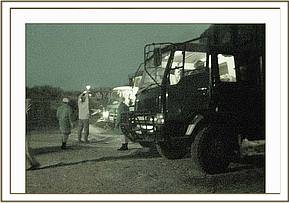
On the appointed day, the 18th June, with the BBC Camera crew in place, before dawn broke, Wendi and Selengai went into the first truck without difficulty, followed by Olmalo and Taita (who needed a last minute shove). Napasha and Tomboi were the candidates for the third truck and although Napasha was wary about going in, greed overcame reluctance, and once he was in, the back door was slammed shut and the cavalcade of eight vehicles took off, three huge trucks carrying the six elephants and their Keepers, two vehicles with the BBC crew, the Mobile Veterinary Unit vehicle complete with our Vet and all the drugs and, of course, Angela’s husband, Robert Carr Hartley who had carefully organised all the logistics. With him was our Assistant, Emma, there to record the action for the foster-parents. However, once the vehicles began to move, and before they even reached our Entrance Gate, Napasha, who is normally a very quiet and gentle character, went beserk in the back of the truck he shared with Tomboi, punching holes in the 44 gallon drum of water, (and fortunately not his Keepers or Tomboi) desperate to try and escape. None of our elephants have ever reacted this way during the move to Tsavo, and we wonder what sinister memories triggered such a violent reaction in this normally very gentle and quiet character. Understanding obviously lies in what could have taken place early in his life, bearing in mind that Napasha had lain down to die in far-off Laikipia when he was found by the herdsman who thought he was already dead, so traumatised that he lacked any will to try to survive even though he was not in a critical physical condition. Obviously the severest damage had been psychological and something about this journey made him recall a severe psychological trauma. We will never know the detail of what took place, but it must have been bad. Some hurriedly cut special extra tasty vegetation kept his mind on other things for the remainder of the journey which was bearable.
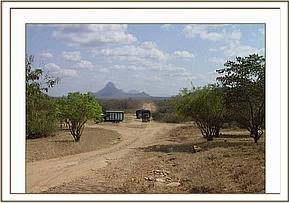
It was an 8 hour journey to Ithumba, much of it on a very dusty deviation on the Mombasa road and then a dirt track to Ithumba via Kibwezi. The vehicles pulled in at 3 p.m. and as soon as the back was opened, Napasha and Tomboi attempted to climb over the opened tailgate, desperate to escape. The other four walked out sedately, puzzled to find themselves in strange new surroundings, though with their Keepers in attendance maintaining continuity within the human family. There they were joined by some of the Voi Keepers who would be known to the elephants to be moved up from Voi. Being a lot warmer in Tsavo, the six Nursery elephants immediately enjoyed a mudbath and a milk feed, before tentatively exploring their new surroundings, their outstretched ears denoting anxiousness. All were understandably nervous and confused, and that first night was stressful for them as they were all together in a large enclosure, outside the comfort of warm Nursery stables with a hot-wired enclosure surrounding them. (Every elephant that is moved to Tsavo has to learn about electricity the hard way).
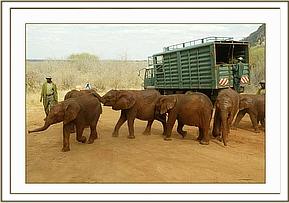

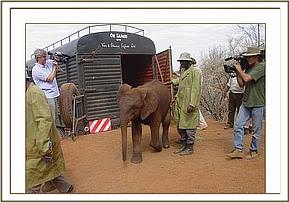

Meanwhile, having off-loaded the Nursery six, and left a BBC camera crew in place, the three trucks, the Tanker, the Vet and Robert headed for Voi through the Park, crossing the Galana river on the causeway built by David way back in the fifties, which provides access to the Northern Section from the South. Once back at the Voi Stockades, again all three trucks were positioned against the loading ramp, but since the four young females identified to be moved all remembered another truck journey to strange surroundings, none were eager to go in during the practice sessions.
Again it was a very early start to the day on the 21st, with Emily, Aitong and all the other Voi orphans leaving the Night Stockades earlier than usual, leaving the four to be moved behind, something that had been happening for several weeks to get the Big Elephants accustomed to their absence. Tempted by sugarcane, copra (and a bottle of milk) Mulika
surprised everyone by venturing in first, followed by Nasalot, who bolted in to join her friend when she was startled by a loud noise. Within moments the first truck was on its return journey to the North. Then it was the turn of Yatta and Kinna,

(who had been kept away), but they were having none of it, so the Vet had to intervene by giving them a mild sedation to making them drowsy enough to be pushed along. This worked fine on Yatta, but the syringe failed to deliver Kinna’s dose and by now she had made up her mind on two issues – that she was going nowhere, and after a prick in the backside, no-one should be behind her! Eventually, she had to be darted with an immobilizer and as the drug took hold, she was steered towards the third open truck, but collapsed just short, so had to be manhandled inside, where she was given the antidote in order to stand up for the journey. The news that all four were on their way came as a welcome relief to those of us waiting anxiously back in Nairobi. The return journey went smoothly and took just 3 hours, all four elephants quiet inside their respective trucks.

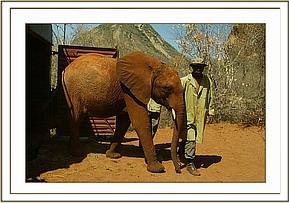
At the other end, they emerged calmly, almost as though they had just been on a small excursion, and were overjoyed to find six small babies to mother. This they immediately did with tender delight, a reunion that left all the human bystanders moved.
Immediately the little elephants calmed down, responding to the presence of larger others with obvious relief, and within a very short time all were romping around in the mudbath happily together. That night, whenever one of the youngsters approached the hot wire, Mulika went to gently steer them away from making contact, something else that moved those that witnessed it.
The next day was spent exploring the great variety of plentiful browse round about, the babies learning from the older elephants how to de-bark the Grewia branches that all elephants relish.

So obsessed were the four larger elephants with their new charges that they slotted in like veterans, showing no signs of missing the Voi contingent at all. Similarly the Voi orphans simply accepted their absence, and their life went on as usual as well. It surprised us that Emily and Aitong did not search for the missing four, for on an occasion when Mulika remained behind playing with a wild friend and the other elephants reached their Night Stockades, she was immediately missed by Emily, who went to retrieve and return her. Perhaps, they understood, picking up the thought processes of their human family – impossible, the sceptics may think, but not for us who know elephants intimately and have done so for half a century! Back in the Nursery, it was Ndomot who was the one that felt the absence of the older inmates acutely. Especially, Wendi was missed by him, for he was particularly fond of her. That day he cried a great deal and became even more clinging to the Keepers, whilst Sunyei went on a long hunt in the forest, searching for her friends. Madiba went to inspect Wendi’s empty stable wondering why she was not with them, but accepted her absence stoically, whilst at first Naserian was reluctant to venture out without Wendi beside her. Having done a long walkabout in the forest and failed to find the missing six, all four remaining Nursery babies stood in a huddled circle with heads pressed together and trunks lying limp on the ground, as though consulting and consoling each other through telepathy. That first day they were all very subdued, and that night, a little restless but the next day life returned to normal in the Nursery, and all enjoyed a romp in the mudbath during the open visiting hour.
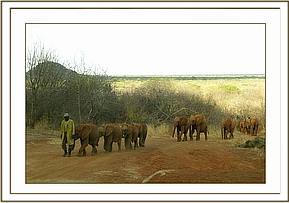
Madiba moved quarters in order to be next door to Naserian without a fuss, leaving Ndomot and Sunyei as night time neighbours. Strangely enough, the one who has noticed the changes most has been “Makosa” our 5 year old rhino, who has long enjoyed greeting Napasha, Olmalo and Taita in their Night Stockades which he passes when he returns to base in the evenings just to make sure that his Nursery Stockade is still there for him with a hand-out of Copra cake inside. Habitually, he always greets the young elephants through the bars of the entrance, and enjoys his face being tickled by prickly trunks. No animal is more sensitive to changes than a rhino, and Makosa has probably noticed the change most. Certainly he is missing the three elephant friends that he has been used to seeing on his return each night.



















